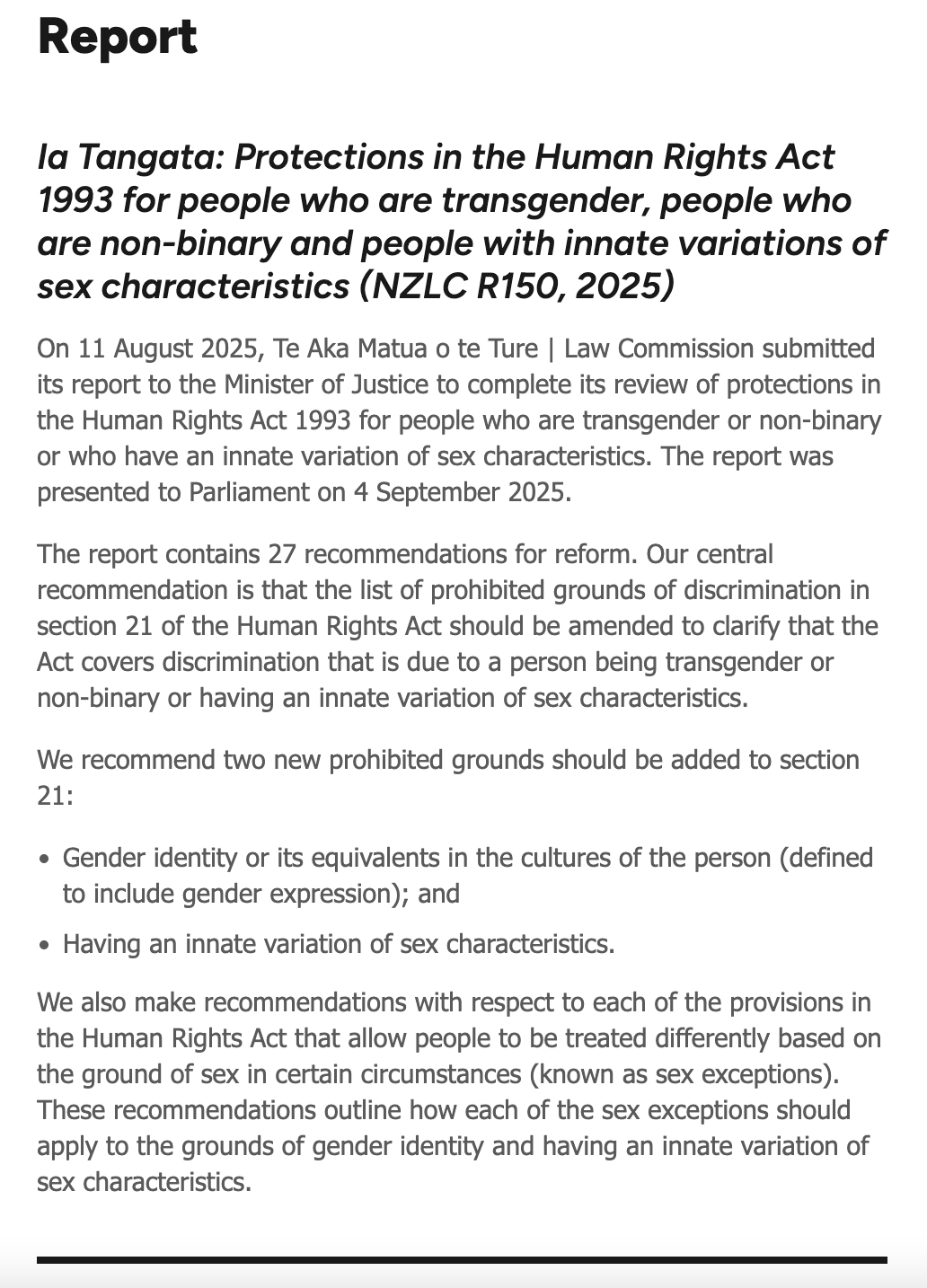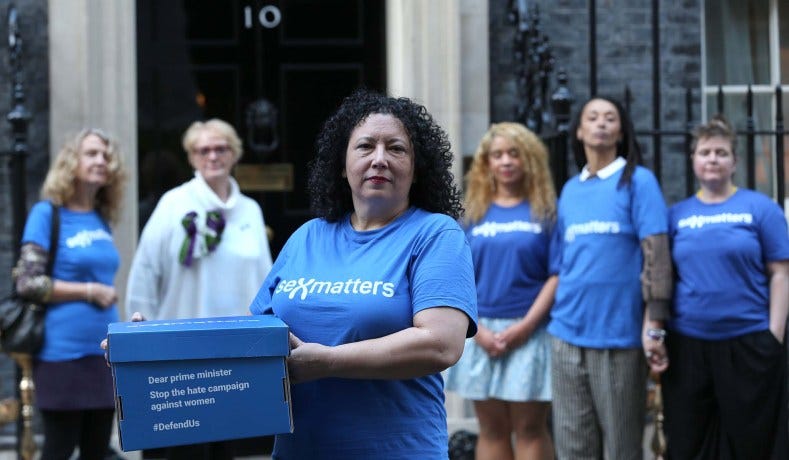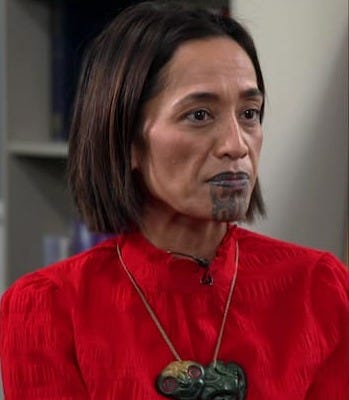'Ia Tangata' has been published and it is as bad as I predicted
When I first warned about the Law Commission’s Ia Tangata review, I said it would be used to smuggle an activist ideology into the Human Rights Act. I said it would not simply “clarify protections” but would tilt the entire playing field, shifting the balance of rights, placing new burdens on ordinary New Zealanders, and hard-coding gender ideology into law.
The report is now out, and unfortunately, I was right.
The report is now out, and unfortunately, I was right.

Click to view
At the heart of the Ia Tangata report is a truly astonishing proposition: that the law should enshrine gender identity, a purely subjective, self-declared, and ever-changing feeling, as a protected characteristic on par with race, age, and disability. This is not protecting something objective and measurable; it is protecting an idea inside someone’s head. The Commission’s definition is so elastic that a person can declare a gender identity at any moment, change it the next day, and demand the world rearrange itself to affirm, and reaffirm, them, with the force of law behind them.
The law usually deals in concrete categories where rights and obligations can be clearly understood. Race, sex, religion, disability; these can be observed, documented, or at least reasonably defined. Gender identity, on the other hand, rejects biological sex altogether. It is not fixed, it is not verifiable, and it can be expanded infinitely to include any number of invented identities: non-binary, demiboy, genderfae, xenogender, and whatever TikTok dreams up next week. The Law Commission has written a blank cheque for ideology, allowing activists to continually stretch the definition while the rest of society scrambles to keep up.
The scope-creep in this legal space is already obvious in practice in New Zealand and overseas. Laws meant initially to protect a tiny minority of transsexual (as they were more accurately called back then) people are now being used to force schools to teach gender identity ideology to children, to allow males into female prisons, and to punish women for stating that only females give birth. By embedding an undefined, subjective category into the Human Rights Act, they would give activists a legal crowbar to use to pry open every women’s space, every sporting category, every workplace policy, and every public debate.
And because gender identity explicitly rejects biological reality, these laws don’t just create confusion, they make it illegal to speak the truth. They create a legal fiction where sex is not what your chromosomes or body say it is, but what you feel it is, and everyone else is forced to play along. If someone insists they are a woman, the law will require you to treat them as one, no matter how obvious the contradiction is. The Law Commission want to make it discriminatory to notice reality.
If there is any argument at all for legal protection of gender identity (which I contend there is not), it is not as a stand-alone category trumping biological sex, it is as a belief, similar to a religious or philosophical conviction. People have the right to believe that gender is innate, that men can become women, that sex is on a spectrum, or that pronouns are a matter of identity rather than grammar. In a free society, you are entitled to hold those beliefs, express them, and live by them. But the right to believe something is not the same as the right to have everyone else believe it too.
We already recognise this principle with religion. The law protects your right to practice your faith, but it does not compel your employer, your neighbour, or your children’s teacher to worship your god, recite your prayers, or agree with your doctrine. We do not make it illegal to say you don’t believe in the resurrection, or to refuse to eat halal meat, or to opt out of religious rituals. The same could apply here: protect the right of individual adults to believe in gender identity, to transition, to express themselves, but do not compel the entire country to participate in affirming that belief.
Framing gender identity as a belief rather than an objective reality also allows space for pluralism. Those who share the belief can live in accordance with it; those who do not can politely dissent. That is how a diverse democracy works. What the Law Commission proposes instead is state-mandated orthodoxy; the elevation of one contested worldview above all others, enforced by tribunals and HR departments. Not freedom, but a compelled belief.
And make no mistake: once gender identity is given the status of a protected category that overrides sex, there will be no escape clause for those who conscientiously disagree. This is already the case in many spaces. Schools, sports organisations, refuges, and workplaces will be required to act as if gender identity is true, not merely to respect the believer’s dignity, but to reorganise their entire practice around that belief. It is as if the law required every New Zealander to participate in a religious ritual under threat of penalty.
Returning to Ia Tangata, the Commission naturally insists that what they have produced is a modest package of reforms, mostly technical, designed to tidy up the Act and provide certainty. They describe the likely changes as “minor” and “clarificatory.” But anyone who actually reads the report (or skims it because it is bloody 500 pages long) can see that it is a radical overhaul of the human rights legal landscape. It creates two entirely new prohibited grounds of discrimination; one for “gender identity or its equivalents in the cultures of the person” and another for “having an innate variation of sex characteristics.” These are not just drafting tweaks. They are political statements. By refusing to accurately define sex (the single most important term for women’s rights) but enshrining gender identity as a protected category, the Commission has deliberately privileged a subjective, self-declared characteristic over a material, biological one.
The effect of this would be profound. Employers, schools, landlords, sports bodies, and service providers would be legally compelled to treat a person’s self-declared gender identity as determinative. The rights of other people, eg women seeking privacy, parents choosing single-sex education for their daughters, female athletes seeking fairness, become subordinate. And if you think I’m exaggerating, just read how the report handles the 19 “sex exceptions” in the Human Rights Act; the provisions that currently allow women to have women-only spaces, services, and opportunities.

“Public toilets were a women’s rights issue in historic Auckland” say Auckland Council…apparently not anymore!
The Commission goes through each of these hard-won carve-outs and systematically rewrites them. Public bathrooms and changing rooms will now be open to anyone who identifies as a woman, unless the provider can prove exclusion is “reasonably required” for privacy. Women’s refuges will be compelled to admit male people who identify as female unless they can demonstrate that doing so would compromise the “welfare” of other residents. A test so vague it will likely deter refuges from excluding anyone at all. Even private single-sex schools, of which there are only a handful left, will have to admit boys who identify as girls, whether parents want it or not. The burden of proof is flipped: women’s rights to single-sex spaces are no longer the default, but the exception that must be justified.
The free-speech implications of this report are also enormous. The Law Commission tries to reassure us that “misgendering” won’t be criminalised, but then immediately carves out an exception where repeated refusal to use someone’s preferred pronouns could be treated as unlawful discrimination. They point to cases overseas where persistent refusal to use preferred pronouns has been treated as workplace harassment. Perhaps they might like also to examine the court cases women have won challenging these things.

Maya Forstater from Sex Matters
This is a legal threat and it tells every teacher, nurse, coach, and office worker in New Zealand that if they express a dissenting view on gender identity too often, they can be dragged through a Human Rights or Employment Tribunal. This will have a chilling effect long before a single case is heard. People will self-censor. Workplaces will write new policies to protect themselves from liability. Schools will silence debate to avoid complaints.
And make no mistake, this is hate-speech law by stealth. The government backed away from hate-speech reforms after a public backlash lead by the Free Speech Union, but here we are again. This time they are using the Human Rights Act as the enforcement mechanism to police belief, opinion, and language. It is a Trojan horse that would let activists weaponise discrimination law against their perceived opponents for saying things as mundane as “men can’t get pregnant.” If this goes through, they won’t need a new criminal statute, they’ll already have a civil process designed to punish heresy and make an example of dissenters.
This is not neutral law. It is compelled speech. It would make disagreement with gender ideology legally risky and eventually socially unacceptable.
If you think this sounds alarmist, look at what just happened in the UK. Last week,
Graham Linehan was detained by five armed police officers at Heathrow Airport over a handful of tame social media posts about transgenderism. The arrest, carried out as he stepped off a flight, was so over the top that even the Metropolitan Police Commissioner later admitted it was an inappropriate use of police resources, saying officers should not be policing “toxic culture-war debates.” J.K. Rowling called it authoritarianism. Elon Musk called it totalitarian. And they’re right. This is what happens when you turn contested ideology into a legal weapon: ordinary speech becomes evidence, dissent becomes a police matter, and citizens are treated like criminals for having the wrong opinions. Do we really think New Zealand will be immune once these changes are in force?

Graham with my dog Lua when he visited New Zealand last year.
Throughout the report, the Commission uses the language of “balancing rights and interests,” but in every contested case it comes down on the side of expanding state power to enforce the gender identity worldview. Women are told that their concerns are “acknowledged” before being subordinated to the new orthodoxy.
The report even purports to consider tikanga Māori and the Crown’s Treaty obligations, but again, always lands on the side of entrenching gender identity protections. The question of how this interacts with sex-differentiated tikanga practices such as karanga and whaikōrero is waved away with the assurance that adding these new grounds is “unlikely” to interfere with tikanga.
Last week, Te Pāti Māori MP Oriini Kaipara described on Q+A how, in te ao Māori, women are revered above all as life-givers; the spiritual arteries of whānau, whakapapa, and future generations. Her words resonated with a cultural certainty: that motherhood, and the female body’s creative power, are not just social roles, but sacred realities rooted in tikanga. Contrast that with the Law Commission’s laughable insinuation that pre-colonial Māori had no firm concept of biological sex until Europeans arrived. That claim flattens centuries of Māori understanding of whakapapa and gender roles into colonial erasure.

New MP Oriini Kaipara
Perhaps the most frustrating part of Ia Tangata is that it pretends to settle the debate about sex and gender rather than recognising that this is one of the most contested questions in modern politics. Instead of acknowledging that one side has introduced entirely new concepts to matters that have been fundamental to human understanding since the beginning of our species, the Law Commission seeks to end the conversation by legislating that side into law. Once passed, these changes will be presented as “human rights,” making any attempt to roll them back appear as an assault on equality itself. Lawfare. The deliberate use of law to close off democratic debate.
One of the most jaw-dropping, infuriating sections of the entire Ia Tangata report is the reference to top law firm Meredith Connell’s so-called “Rainbow Alliance” breezily declaring that the undeniable advantage trans-identified males have over women in sport is just a “fact of life” we should all accept. This sneering contempt is the legal establishment looking every Kiwi girl in the eye and saying: your fairness, your safety, your sporting dreams don’t matter. It is a green light for women’s sport to be colonised by males and we are told to shut up, smile, and clap for our own erasure. Progress? It is a brutal regression dressed up in rainbow language. It takes us back to a time when women were told that our job was to support men, cook and clean for them so that they can go out into the world and succeed, and to stop complaining about being disadvantaged. The Law Commission has sided with those who think equality for women is negotiable, expendable, and worth sacrificing on the altar of ideology. It is a betrayal and it should enrage every woman in this country. Frankly, the angry women’s rights activist on me wants tear shreds off whoever signed off Meredith Connell’s submission. What the F**K is wrong with them?

Click to view
And then there’s the unintentionally hilarious (if it weren’t so insulting) moment where the report solemnly informs us that “most people giving birth are women, but not all.” Thank you, Law Commission, for that groundbreaking revelation. Next they’ll be telling us that “most roosters can’t lay eggs, but not all,” or that “most sperm donors are male, but not all.” This is the kind of language that should be laughed out of the room and yet here it is, sitting in an official document, funded by taxpayers, intending to shape the laws that govern our lives. It’s bloody absurd. This is what happens when ideology takes over: plain facts become dangerous, words are twisted into nonsense, and women are linguistically airbrushed out of existence.
This is a political project. And now that it has been delivered to the Government, the ball is in their court. If they have any backbone at all, they should reject it and condemn the ideological capture of the Law Commission.
Newsroom’s (totally captured) Marc Daalder reported this week:
Goldsmith presented the Law Commission’s report to the House on Thursday. The Government now has 120 days to provide a response if does not accept the commission’s recommendations. If it chooses to accept them, there is no requirement to provide a response and the ministry responsible for the changes (likely the Ministry of Justice) will begin working on legislation, although this can take several years.
If National, ACT, and NZ First go along with this, it will be part of their legacy. They will be the government that erased sex from the law, dismantled women’s rights to single-sex spaces, and put ordinary Kiwis one HR complaint away from losing their jobs for speaking fundamental truths. Their voters will not forgive them and nor should they. The problem is the media will continue to gaslight the country with the narrative that (never mind all polling to the contrary) it is the supporters of the erasure of sex who are in the majority. Will our government be capable of ignoring their activism?
But we should not wait for Wellington to save us. MPs need to hear, loudly and clearly, that the public does not accept the erasure of sex, the loss of single-sex spaces, or the creeping criminalisation of dissent. This report should not be quietly nodded through.
I said there was trouble incoming. Well, here it is. And if we don’t push back now, the trouble will become the new normal.
Ani O'Brien comes from a digital marketing background, she has been heavily involved in women's rights advocacy and is a founding council member of the Free Speech Union. This article was originally published on Ani's Substack Site and is published here with kind permission.


No comments:
Post a Comment